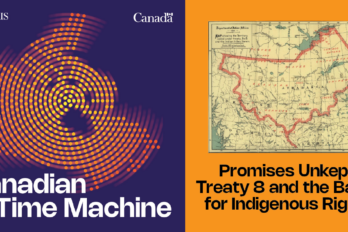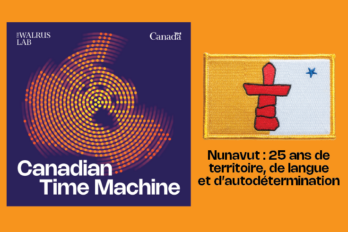SHOW NOTES:
SOURCES USED IN THIS EPISODE
The music for this episode is a licensed version of “This Podcast Theme” by InPlus Music. Additional music are licensed versions of “Stay Cool” by Loops Lab, “Podcast Intro” by InPlus Music, “Floating Cities” by Kevin MacLeod, “Lightless” by Kevin MacLeod, “Shores of Avalon” by Kevin MacLeod, and “Comfortable Mystery” by Kevin MacLeod.
LINKS MENTIONED IN THIS EPISODE:
ADDITIONAL LINKS:
TRANSCRIPT:
SHEENA ROSSITER: Welcome to Deep Dive, a weekly podcast that takes a deeper look into the happenings at The Walrus.
I’m Sheena Rossiter.
ANGELA MISRI: And I’m Angela Misri.
On this week’s episode.
ANNIE HYLTON: Canada’s decision to claim Ayoob is a national security threat, and is an alleged member of a terrorist organization, is really rooted in China’s long history of repressing Uyghurs and framing them as terrorists.
ANGELA MISRI: This week we’ll hear from Annie Hylton. For the March/April issue of The Walrus, Annie takes a look at the long, and complex case of Ayoob Mohammed.
SHEENA ROSSITER: He’s a Uyghur man. Uyghurs are a largely Muslim, Turkic-speaking ethnic group, and they are persecuted in China. Recently Canada’s Parliament recognized what’s happening to Uyghurs as genocide.
ANGELA MISRI: While Ayoob was trying to escape persecution in China in 2001, he found himself in Afghanistan during 9/11. And in the chaos that ensued, he was sold for bounty to US forces and sent to Guantánamo Bay.
SHEENA ROSSITER: US officials then maintained that Ayoob was a member of ETIM, allegedly a Uyghur terrorist group, though this may have been part of an attempt to secure China’s support for the war on terror.
ANGELA MISRI: Today, Annie takes readers through Ayoob Mohammed’s long and complex journey from his birthplace in China to Guantánamo Bay to Albania, while also chronicling his attempts to join his family in Canada.
SHEENA ROSSITER: Annie is an independent investigative journalist and writer from Saskatchewan who’s now based in Paris, where she is an associate professor at Sciences Po. She won a gold National Magazine Award for her 2020 long-form feature “Searching for Mackie,” which was published in The Walrus.
ANGELA MISRI: Let’s hear your conversation with Annie Hylton.
SHEENA ROSSITER: Can you tell us a little bit about Uyghur Muslims in the community in China. Who are they?
ANNIE HYLTON: Uyghurs are a largely Muslim Turkic-speaking ethnic group, whose homeland lies in the northwest of modern day China. They are native to present day Xinjiang, a region many Uyghurs refer to as East Turkestan. And today, Xinjiang is one of China’s most ethnically diverse areas, with over 12 million Uyghurs, who make up the largest ethnic minority.
SHEENA ROSSITER: How did they come to be a persecuted group in China? And how long has this really been going on for?
ANNIE HYLTON: Yeah. So, this is a very long story. I will try to be brief.
So, a tempestuous history defined the Uyghur’s homeland. And a string of governments, first under the Qing dynasty, fought to control the land and its people. Fast forward to communist China, which swept in and conquered the area. And communist China had ambitions to develop the region for foreign trade and economic pursuits, and in the process, encouraged China’s dominant Han ethnic group to move to the region. So around then, demographics shifted and inequality grew, and the Uyghurs were periodically purged of the opportunity to practise their traditions, and speak their language, and were often targeted by authorities.
So, political activism grew, and China became concerned with ethnic nationalism and organized political opposition. And this is sort of the root. And this really led to a giant crackdown, the culmination of which led, in recent years, which many of us have heard about, to the detention of thousands of Uyghurs and other Turkic and Muslim minorities.
SHEENA ROSSITER: Let’s get more into the details of your feature for the March/April issue of The Walrus, which looks at the story of Ayoob Mohammed, who is a migrant Uyghur. Can you tell us a little bit more about him, and who he is as a person?
ANNIE HYLTON: Ayoob, who is now in his late thirties, has spent more than half of his life fighting one government or another to be free. He was born and raised in Xinjiang, in a city near the Kyrgyzstan border. And he grew up in a modest home, with a loving family who had ambitions for him to pursue an education outside of Xinjiang, where opportunities for Uyghurs were severely restricted.
So to make a long story short, after leaving Xinjiang at the age of 18, in the summer of 2001, with dreams of studying in the US, Ayoob wound up sold to the United States for bounty as an alleged terrorist in post 9/11 Pakistan. He was then held for four years at the Guantanamo Bay detention facility, and finally exonerated and resettled in Albania, now 16 years ago.
And in the meantime, he met a wife, a Uyghur Canadian woman, and had two children with her. And since then, for the past eight years or so, he’s been in a protracted fight to resettle in Canada with his wife and children, who are Canadian citizens and live in Canada. And he has been denied resettlement for national security reasons. And in the piece, I argue, essentially, that Canada’s decision to claim Ayoob is a national security threat, and is an alleged member of a terrorist organization, is really rooted in China’s long history of repressing Uyghurs and framing them as terrorists.
SHEENA ROSSITER: How did 9/11 make the situation worse?
ANNIE HYLTON: Yeah. So, this is a fascinating, very terrible story for Ayoob. Essentially, China saw an opportunity to align with the US’ amorphous definition of the so-called war on terror, to justify further repressing Uyghurs. So, what before 9/11 had been mostly seen as China’s local grievances with the Uyghurs, was rebranded as terrorism. And to be clear, there were certainly Uyghur separatists and calls for independence in the region, but academics, and researchers, and those familiar with the region at the time, widely saw this narrative shift as a means to further repress the Uyghurs. And it’s a complicated story, but China claimed one group, which it called the East Turkestan Islamic Movement, was responsible for several terrorist incidents, and linked Ayoob and 21 other Uyghurs as being members of this group.
Around then, China claimed one group, which it called the East Turkestan Islamic Movement, was responsible for several terrorism incidents, and was linked with foreign terrorist organizations. And Ayoob, along with 21 other Uyghurs, found himself in the wrong place at the wrong time, when he was sold for bounty and transferred to Guantanamo Bay. And there, authorities claimed he was a member of this so-called East Turkestan Islamic Movement, or ETIM. The US and UN then added this group to a couple of terrorist lists, which gave further justification to hold the Uyghurs in Guantanamo Bay without charge.
And lawyers, and researchers, and academics surmised, that given the timing of these listings, that the Uyghurs held at Guantanamo Bay became ponds for the Bush administration’s plans to invade Iraq. It’s all very complicated. There are many threads. In essence, the US needed China’s support in the UN Security Council to invade Iraq. It never ended up getting the support of the Security Council, but this was sort of the framing at the time, that there was sort of a quid pro quo. US officials, of course, denied this framing.
But any case, eventually, Ayoob was exonerated and transferred from Guantanamo. But the point is that the stamp of Guantanamo Bay, and this terrorist narrative, shadows him everywhere he goes, including in his efforts to resettle with his family in Canada.
SHEENA ROSSITER: As you said, there are many, many threads, which is why this is such a long read. In the first place, how did you end up coming across this story?
ANNIE HYLTON: I was researching another story related to Canada’s Safe Third Country Agreement with the US, and how it impacts, slash harms, asylum seekers. And Ayoob’s current lawyer had been representing a woman who had a very powerful, meaningful story, and in passing mentioned Ayoob’s case. And this was a few years ago, but the facts he shared never left me. And as the public attention has turned increasingly to the extent of China’s repression of Uyghurs, I decided to revisit it. And the timing, I think, was quite important, because had I approached the piece earlier, I’m not sure I would’ve made the links between Ayoob’s identity as a Uyghur, the Chinese government’s role in branding him a terrorist threat, and his resettlement in Canada.
SHEENA ROSSITER: So, what’s his life like now that he’s been exonerated, and he’s resettling in Canada?
ANNIE HYLTON: So, he has been resettled in Albania for now, about 16 years, where he has a form of refugee status without the full rights of being a refugee. So, his travel is restricted. He’s forbidden from leaving the country. He has no identity documents, and does not have the right to work. He receives a modest stipend from the Albanian government, and lives very precariously, according to him. And is, essentially, most days of the year, separated from his wife and children. And last summer, I travelled to Albania to see him, and his wife and children were visiting him for the first time in two and a half years. So, life for Ayoob has been unrelenting.
SHEENA ROSSITER: The plight of Uyghur Muslims has been getting a little bit more attention, namely in recent times, with the winter Olympics being in Beijing, and other high profile athletes and celebrities that have been shining a light on these human rights abuses. Has this helped make things a little bit better for Uyghurs?
ANNIE HYLTON: The short answer is, no. There doesn’t seem to be any evidence, at least that I’m aware of, that China has changed its policies despite diplomatic pressures and sanctions.
SHEENA ROSSITER: And how has Canada’s position changed on Uyghur Muslims?
ANNIE HYLTON: Yeah. This is a great question. So, human rights groups and Uyghur advocates in Canada have criticized Trudeau’s government for not doing more to denounce China’s treatment of Uyghurs, or taking a stronger stance against China. While, in February of last year, Canada’s parliament voted overwhelmingly to recognize the treatment of Uyghurs in Xinjiang as genocide…
AUDIO FROM GLOBAL NEWS: The House of Commons has voted to declare what’s happening to the minority Muslim Uyghur population in China, a genocide. The motion was put forward by the Conservatives, who called on the Liberals to send a united message about human rights. No MPs voted against it, but not everyone voted for it.
ANNIE HYLTON: Trudeau, and nearly his entire cabinet, abstained from the vote. And last March, Canada joined other countries like the US, and those in the EU, and the UK, in slapping sanctions on several Chinese officials, and one entity, for human rights violations in Xinjiang. But Trudeau has been very careful not to use the term genocide, which he has said is “extremely loaded”.
And I will add, Ayoob is not the only Uyghur who was formerly held in Guantanamo Bay seeking family reunification in Canada. There are two other men who live in Bermuda, Salahidin Abdulahad and Khalil Mamut, also have Canadian wives and children, and have been prevented from reuniting with their families as well, for the same reason as Ayoob. And the decision not to allow these men into Canada, according to activists and lawyers, is merely political, and something that the Trudeau government could easily solve, but has chosen not to.
SHEENA ROSSITER: Is part of the reason because China is such a heavyweight, and such a big player, such a big economy, that Canada doesn’t want to get involved, especially after the two Michaels incident?
ANNIE HYLTON: I think that’s a question that many people are raising. And there’s one activist, Mehmet Tohti, who says that the decision not to resettle these men is merely political. And the Trudeau government has come under fire for prioritizing economic and diplomatic ties with China, in favour of taking a stronger stance against denouncing human rights violations.
SHEENA ROSSITER: Now, let’s check out what Annie is watching right now.
ANNIE HYLTON: It’s a show called Euphoria, which is an HBO drama series that follows a group of high school students. It’s a raw, often devastating, portrait of the challenges of addiction, and betrayal, and navigating violent and toxic relationships. What I like about this show is that it feels like an authentic experience, and is even cathartic for me at times. It’s not lazy, empty escapism, which is the type of entertainment that I’ve found myself drawn to during the pandemic. So, sometimes the show is uncomfortable, but there’s something profound about feeling like you’re observing a former version of yourself learn and grow.
SHEENA ROSSITER: That’s my conversation with Annie Hylton. The editor for her piece is Harley Rustad. You can read Annie’s story “Endless Exile: The Tangled Politics Keeping a Uyghur Man in Limbo,” at thewalrus.ca right now.
WHAT WE’RE TALKING ABOUT THIS WEEK AT THE WALRUS:
MIHIRA LAKSHMAN: I’m Mihira Lakshman, and here’s what we’ve been talking about this week at The Walrus.
All eyes are on Ukraine right now, including inside The Walrus, as the war unfolds and the situation evolves. Like many of you, we’ve been sharing links to donate money in the hopes that it helps the population of Ukraine. The Globe and Mail posted an article specific for Canadians looking to help.
We put the May/June double issue to bed this week, including a story about the promise of $10 childcare – and we’re planning an Article Club around it because we know how much conversation that topic generates. I wrote a piece about the challenges of being a working parent, trying to work over Zoom, and care for a young child. That was almost two years ago, if you can believe it. Coming out of this pandemic in whatever form that takes, childcare continues to dominate many of our lives.
As always, the links for all these articles can be found in the show notes for this episode.
CREDITS:
SHEENA ROSSITER: Thanks for joining us on this week’s episode of the Deep Dive. It was produced by Angela Misri, and me, Sheena Rossiter. I also edited this episode.
Music for this podcast is provided by Audio Jungle. Our theme song is This Podcast Theme by Inplus Music. Additional music is Stay Cool by Loops Lab, and Podcast Intro by Inplus Music. You also heard “Lightless,” “Floating Cities,” “Shores of Avalon,” and “Comfortable Mystery” by Kevin MacLeod, provided by Film Music.
Lightless Dawn by Kevin MacLeod
Link: https://incompetech.filmmusic.io/song/3982-lightless-dawn
License: https://filmmusic.io/standard-license
Floating Cities by Kevin MacLeod
Link: https://incompetech.filmmusic.io/song/3765-floating-cities
License: https://filmmusic.io/standard-license
Shores of Avalon by Kevin MacLeod
Link: https://incompetech.filmmusic.io/song/4349-shores-of-avalon
License: https://filmmusic.io/standard-license
Comfortable Mystery by Kevin MacLeod
Link: https://incompetech.filmmusic.io/song/3531-comfortable-mystery
License: https://filmmusic.io/standard-license
Additional sources for this episode were provided by Global News on YouTube.
Don’t forget to subscribe to Deep Dive from The Walrus on Apple Podcasts, Spotify, or wherever you get your podcasts. And if you like what you heard, please leave us a review and rating. It really helps people find the podcast.
Until next week when we take our next deep dive.









